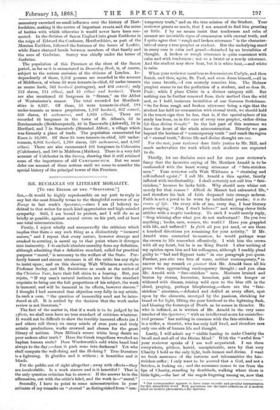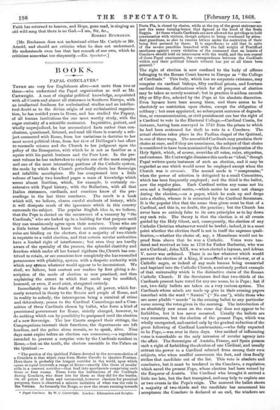MR. BUCHANAN ON LITERARY MORALITY. [To THE EDITOR OF THE
"SPECTATOR."]
SIR,—It would be highly reprehensible on my part to reply in any but the most friendly terms to the thoughtful reviewer of my Essays in last week's Spectator,—since I am (I believe) in- debted to that writer for much kind appreciation and high-minded sympathy. Still, I am bound to protest, and I will do so as briefly as possible, against several errors on his part, and at least one total misconstruction.
Firstly, I reject wholly and unreservedly the criticism which implies that there is any such thing as a distinctively " immoral nature," and I repeat that every nature, however strange and crooked to scrutiny, is moral up to that point where it diverges into insincerity. I do exeludeabsolute morality from my definition, although admitting that a definitive standard, called for practical purposes "moral," is necessary to the welfare of the State. Per- fectly honest and sincere utterance is all the critic has any right to insist upon ; and on this showing Walt Whitman as much as Professor Seeley, and Mr. Swinburne as much as the author of the Christian Year, have their full claim to a hearing. But, you rejoin, "If any man's natural instincts are below the standard requisite to bring out the full proportions of his subject, the work is immoral, and will be immoral in its effects, however sincere." I thought I had answered that objection very fully in my article. In such a case, "the question of immorality need not be intro- duced at all. It is settled by the decision that the work under review is not literature."
The fact of the matter is, that if a work is to be judged by its effects, we shall soon have no true standard of criticism whatever. It would not be difficult to show the terribly immoral effects (as I and others call them) on many minds of even pure and truly artistic productions, works crowned and chosen for the great library of nations. Does Milton's severe white lamp dazzle no poor seekers after truth ? Have the Greek tragedians wrecked no hapless human souls? Does Wordsworth's cold white hand lead always to the day ;—does it push none into darkness? Yet who shall compute the well-doing and the ill-doing ? True literature is a lightning. It glorifies and it withers ; it beautifies and it blinds.
Put the public out of sight altogether ; away with effects—they are incalculable. Is a work sincere and is it beautiful ? That is the only question criticism has to answer. If the answer be in the affirmative, out with the critic's label, and the work is—" moral." Secondly, I have to point to some misconstruction in your estimate of my remarks on " eternal " as distinguished from "con- temporary truth," and on the true mission of the Student. Your reviewer grants so much, that I am amazed to find him granting so little. I by no means insist that tenderness and calm of manner are invariable signs of communion with eternal truth, and I quite agree that "rough and broken utterance" is the character- istic of many a true prophet or student. But the underlying mood in every case is calm and grand—disturbed by no brutalities of thought. A broken or rough utterance is quite consistent with calm and with tenderness ; not so a brutal or a rowdy utterance. And the student may show heat, but it is white heat,—and white is calm.
When your reviewer mentions as denunciators Carlyle, and then Isaiah, and then, again, St. Paul, and even Jesus himself,—all in the same breath,—I can scarcely conceive him. The Hebrew prophet seems to me the perfection of a student, and so does St. Paul ; while I place Christ in a diviner category still. But nothing can be further removed from their method than the wild and, as I hold, insincere brutalities of our German Scotchman. "So far from rough and broken utterance being a sign that the student has held no communion with eternal truth, we should hold it the truest sign that he has, that is, if the special sphere of his study has been, as in the case of every true prophet, rather divine life than divine thought." In the last part of this sentence we have the heart of the whole misconstruction. Directly we pass beyond the horizon of "contemporary truth "and reach the region of "eternal truth," divine life and divine thought are one.
For the rest, your reviewer does little justice to Mr. Mill, and much undervalues the work which such students are expected to do.
Thirdly, let me disclaim once and for ever your reviewer's fancy that the lazaretto crying of Mr. Matthew Arnold is to be confounded with the heart wrung utterance of "fate-stricken men." Your reviewer calls Walt Whitman a "straining and self-inflated egoist ;" I call Mr. Arnold a thin egotist, faintly inflated with intellectuality. I shall certainly not call him "fate- stricken," because he lacks faith. Why should men whine out merely for that reason ? Alfred de Musset had exhausted life,' and therefore his lack of faith deepened into strange sadness. Faith is not a jewel to be worn by intellectual prudes ; it is the crown of life. On every side of me, every day, I hear literary youths saying, "Alas, I don't believe !" and writing clever little articles with a sceptic tendency. To such I would merely reply, "Stop whining after what you do not understand ! Do you love anything ; books, men, women, the world ? Have you grappled with life, and suffered ? Is faith all you yet need, or are there a hundred directions yet remaining for your activity." If Mr. Arnold were converted to-morrow, he would perhaps wear the crown to life somewhat offensively. I wish him the crown with all my heart, but he is no King David. I alter nothing of my opinion upon him and his colleagues, although I readily plead guilty to "bad and flippant taste" in one paragraph you quote. Further, you cite two bits of verse, neither contemporary,* in answer to my remark en passant that Mr. Arnold loses all his grace when approaching contemporary thought ; and you class Mr. Arnold with " fate-stricken " men. Mariners bruised and beaten by storms, havenless, homeless, pale with hunger or withered with disease, raising wild eyes to the blue rift in the cloud, praying, perhaps blaspheming,—these are the "fate- stricken" creatures,—defeated and defiled at every effort, spat
upon by the elements, scourged by the passions, shrieking for bread or for light, lifting the poor forehead to the lightning flash, and blessing the footsteps of Death as he conies in thunder. He who is inflated, as is written of Mr. Arnold in the very same number of the Spectator," with an intellectual scorn for unintellec-
tual persons" has nothing in common with the fate-stricken. He is a trifler, a theorist, who has ouly half lived, and therefore sees only one side of human life and thought.
Lastly, I will admit my " visible leaning to make Charity the be-all and end-all of the Divine Mind." With the "awful fires" your reviewer speaks of I am well acquainted. I see them everywhere, pitiless, horrid, unexplainable, save by that very Charity I hold as the only light, both human and divine. I want no fresh assurance of the tortures and inhumanities the fate-
stricken suffer; I only want to be assured that a God, and not a Setebos, is looking on ; and the assurance comes to me from the lips of Charity, standing by deathbeds, walking where there is little light,—the last of the angels lingering among us, now that * Our correspondent appears to have some esoteric and peculiar interpretation for this remarkable word. Both quotations are the latest reflections of a modern mind on modern phenomena.—En. Spectator.
Faith has returned to heaven, and Hope, gone mad, is singing an old wild song that there is no God.—I am, Sir, &c.,
ROBERT BUCHANAN.
[Mr. Buchanan does not understand either Mr. Carlyle or Mr. Arnold, and should not criticize what he does not understand. He understands even less that last remark of our own, which he criticizes somewhat too eloquently.—En. Spectator.]































 Previous page
Previous page